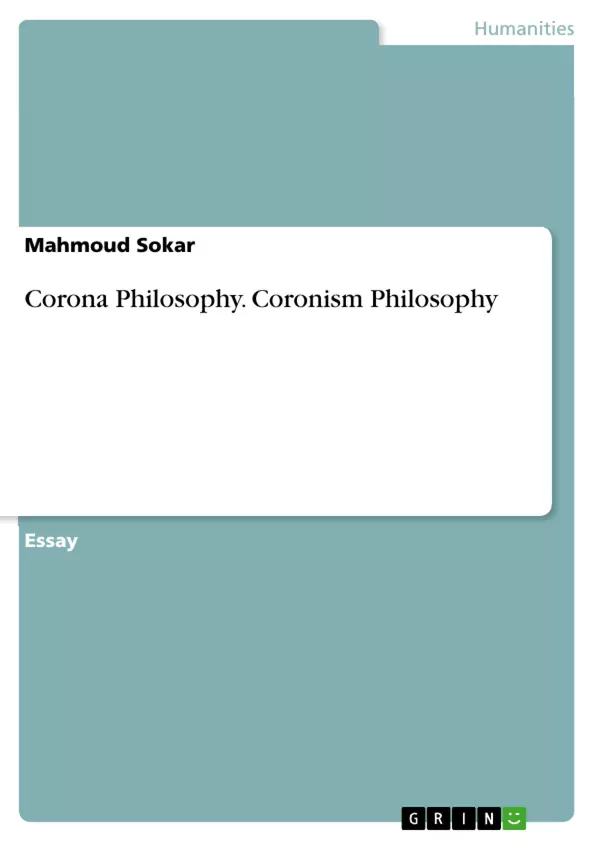The last ten decades have witnessed a great philosophical change. Humanity has moved towards absurdity, fragmentation, and nihilism. Hyper-reality and techno-culture have dominated the scene. The value of life has vanished. Humanity fell in a great depression. Capitalism has the upper hand. The aesthetics of art and literature have been substituted by the visual domination and Para-literary human activities, such as comics, electronic music, and the movies with strong visual effects. Thus, humanity needed a strong shock for restoring its creativity, simplicity, ability to evaluate beauty, and regarding the value of life itself. Here, it was the appearance of what Donald Trump has named the “Chinese virus” which has reconsidered the human mentality and philosophy.
Inhaltsverzeichnis (Table of Contents)
- Corona Philosophy
- The Human Mentality and Philosophy
- Religious Matters
- Man-Technology Relationship
- Nihilism
- Corona and Conspiracy Theories
- The American Dream
- Corona and Ecology Philosophy
- Gaia Hypothesis
- Nature Wrath
- Corona and Globalization
- Corona and Dystopia
- Corona and the Literary Arena
Zielsetzung und Themenschwerpunkte (Objectives and Key Themes)
The primary objective of this text is to analyze the philosophical and societal implications of the COVID-19 pandemic. The text explores how the global crisis has reshaped human perspectives on life, technology, religion, globalization, and power dynamics.
- The impact of the COVID-19 pandemic on human mentality and philosophy
- The role of technology in coping with and responding to the pandemic
- The influence of the pandemic on globalization and international cooperation
- The relationship between the pandemic and environmental issues, including the Gaia hypothesis and the concept of nature's wrath
- The emergence of dystopian tendencies in both individual and governmental responses to the crisis
Zusammenfassung der Kapitel (Chapter Summaries)
- The text opens by exploring the philosophical shifts that have occurred in the last century, leading to a sense of absurdity, nihilism, and the dominance of hyper-reality and techno-culture. The author argues that the COVID-19 pandemic has served as a catalyst for re-evaluating the human condition, prompting a reassessment of values and a renewed appreciation for the simplicity of life.
- The second chapter focuses on the specific impact of the pandemic on human mentality and philosophy. The author discusses the resurgence of spirituality and religion amidst the pandemic, the complex relationship between humans and technology, and the philosophical concept of nihilism, which has both been intensified and challenged by the crisis.
- The third chapter explores the political implications of the pandemic, specifically concerning conspiracy theories surrounding its origins. The author examines conflicting views regarding the virus's origins, particularly in relation to the relationship between the United States and China, and its potential impact on the American Dream.
- The fourth chapter examines the intersection of the pandemic with ecology philosophy. The author discusses the relevance of the Gaia hypothesis in understanding the pandemic's impact on the environment, highlighting the ability of nature to regenerate even as human life faces challenges. The chapter also discusses the concept of power-over and how the pandemic has challenged traditional notions of human dominance over nature.
- The fifth chapter explores the implications of the pandemic for globalization, arguing that the crisis has revealed the limitations of international cooperation and highlighted the fragility of global interconnectedness. The author analyzes the criticisms directed at international organizations such as the World Health Organization (WHO) and the European Union (EU) in their initial responses to the pandemic.
- The sixth chapter analyzes the emergence of dystopian tendencies during the pandemic. The author discusses both governmental and individual responses to the crisis, highlighting instances of corruption, price gouging, and the erosion of social norms. The chapter argues that the pandemic has exposed a dark side of human nature.
Schlüsselwörter (Keywords)
The key concepts explored in this text include Coronism, COVID-19 pandemic, nihilism, technology, globalization, Gaia hypothesis, power-over, dystopia, conspiracy theories, and the American Dream. The text analyzes the impact of the pandemic on human mentality, philosophy, society, and the environment, highlighting the need for a reassessment of values and a more nuanced understanding of the human condition in a globalized and technologically advanced world.
Frequently Asked Questions
What is "Coronism Philosophy"?
It refers to the shift in human mentality and philosophy triggered by the COVID-19 pandemic, leading to a reassessment of technology, religion, and values.
How did the pandemic affect the perception of technology?
The text explores the man-technology relationship, noting how techno-culture dominated the scene but also how the crisis prompted a return to simplicity.
What is the Gaia hypothesis in the context of COVID-19?
The Gaia hypothesis suggests that nature can regenerate and respond to human dominance, with the pandemic seen by some as "nature's wrath."
How does the text link the pandemic to nihilism?
It argues that while humanity was moving towards nihilism and absurdity, the pandemic served as a shock that could restore creativity and the evaluation of beauty.
What dystopian tendencies are identified in the text?
The author discusses instances of corruption, price gouging, and the erosion of social norms as part of the dystopian response to the crisis.
- Citation du texte
- Mahmoud Sokar (Auteur), 2020, Corona Philosophy. Coronism Philosophy, Munich, GRIN Verlag, https://www.grin.com/document/974493



